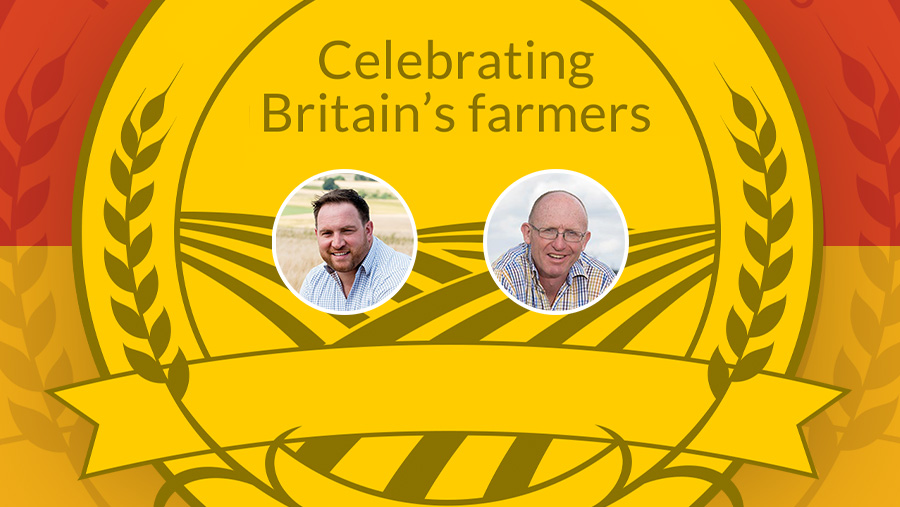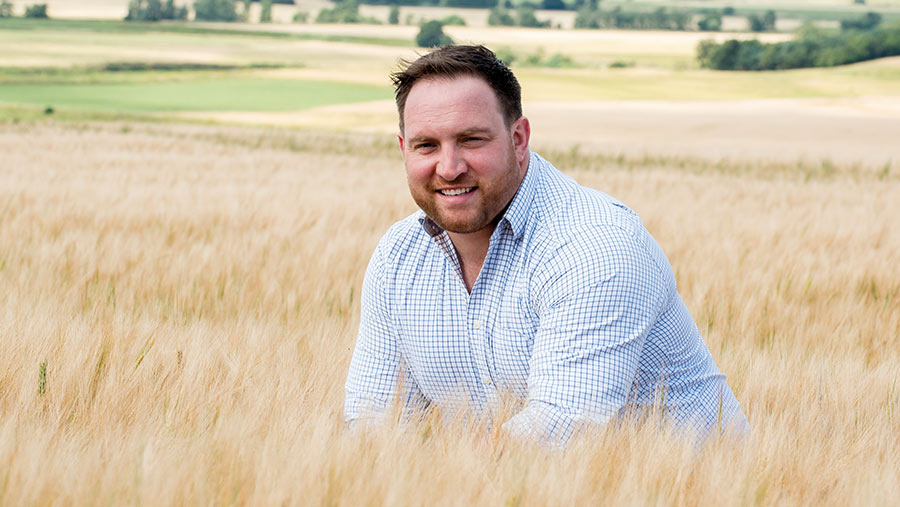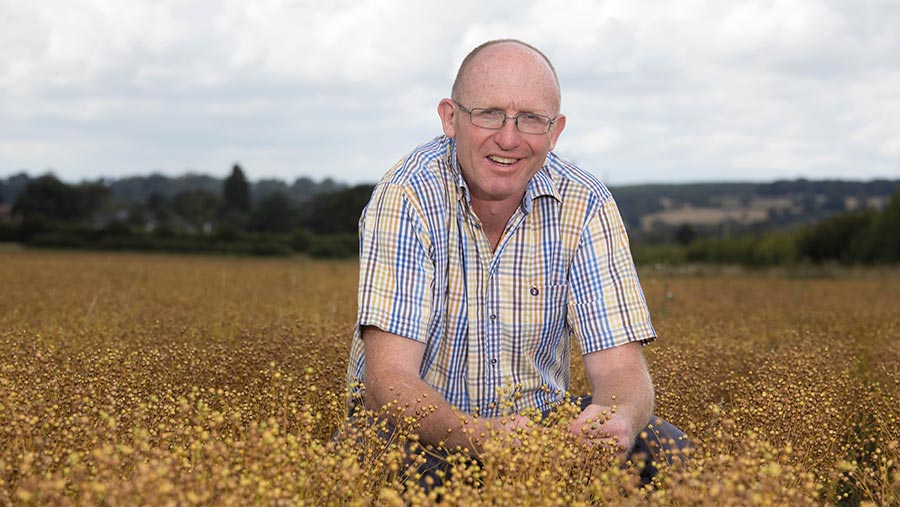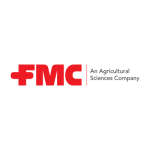Farmers Weekly Awards: Arable Adviser of the Year finalists 2020

A tight field of entries means just two agronomists are battling it out for the biggest prize in arable advice. At different stages of their careers, they both go the extra mile to put their growers’ needs first.
The 2020 Arable Adviser of the Year finalists:
- Charlie Catto
Daviot, Inverurie, Aberdeenshire - Mark Dewes
Withybrook, Coventry, Warwickshire
The judges
- Alison Cross
Last year’s winner - Johann Tasker
Farmers Weekly chief reporter - John Barrett
Business manager, Sentry Norfolk and Suffolk
See also: Farmers Weekly Awards 2019: Arable Adviser of the Year
Charlie Catto
Daviot, Inverurie, Aberdeenshire
Agronomist Charlie Catto looks after 49 customers across Aberdeenshire – stretching from mountain to sea in the most easterly part of Scotland.

© Angus Findlay
Covering a farmed area of 10,658ha, Charlie’s customers are mainly owner-led farms, but include two estates with their own farm managers. Working for Agrii, Charlie devises a bespoke package for each farm – tailoring it to each client’s situation and business objectives.
“Although I work for a company, everything I advise is completely for the benefit of my customer,” he says. “If there is no yield advantage, cost saving or environmental positive impact it is not recommended.”
Charlie enjoys mixing the traditional aspects of agronomy with more modern approaches – helping farmers access new technology to boost their profitability and enterprise efficiency while working hand-in-hand with the environment.
Predominantly sandy loam soils, most farms require significant nutrition and correct lime use to achieve decent wheat yields. Building the correct foundations are the starting point of how the agronomy business operates.
Grower support
Aberdeenshire is home to a lot of spring malting barley. With a big demand across the country from whisky distilleries, it is a major crop. The region is so far unaffected by cabbage stem flea beetle, so a large amount of oilseed rape is grown.
Feed grains, barley and wheat are also produced as the area has a big livestock sector too. Customers include several pig producers with high soil fertility and slurry use. But getting the best out of crops can be a challenge.
To achieve this, Charlie encourages muck-for-straw deals with pig producers, exchanging farmyard manure with purely arable growers for a ready supply of straw. He also gets slurry incorporated before planting crops in the autumn.
By importing slurry for straw, growers saved on average £30/ha on fertiliser for oilseed rape in 2019. Pig producers also benefited, securing somewhere to apply their slurry – keeping them within nitrate vulnerable zone requirements.
Innovations
In recent years, Charlie has encouraged more digital and data-based farm management methods to improve efficiency where appropriate. They include combine yield mapping, variable seed rates, variable rate nutrition and tissue testing.
“In 2017, I started tissue testing one or two of my clients’ crops at key growth stages to identify limiting factors to their crops’ yield potential. I now regularly tissue test all my clients’ crops to identify any nutritional deficiencies,” he explains.
“On the back of this, three crops of winter wheat that were given tailor-made nutrition averaged 12t/ha. That’s a good yield on our soils – and it proved to me that testing the growing crop is a necessity for any adviser.”
With several customers joining the agri-environment scheme in 2016, Charlie now has growers drilling autumn cover crops to utilise nutrients and dry matter before spring malting barley. This has reduced nutrient losses, run off and leaching as well as improving soil structure.
Future
Trial plots form a key part of determining what works best locally. Charlie manages the local trials site – and hosts three meetings for local farmers throughout the year.
This has encouraged farmers to exchange knowledge, adopt new working practices and challenge the way they farm, he says.
“It can be a lonely job for some growers. I’m a listening ear as well as part of their business. In bad weather or in tough times, I always try and brighten their day with a funny story or a bit of banter. I always say the job is hard enough without a laugh.”
What the judges say
Charlie clearly understands his growers’ needs and enjoys working with his customers – essential qualities for a top adviser. He is focused on finding the best solutions and is an asset to their businesses.
Summary
What the judges liked
• Fully understands client needs and grain markets
• Goes extra mile for farmers to deliver best service
• Oversees local trials assessing varieties, fertilisers and sprays
• Resource protection and biodiversity are important
• Passionate about community involvement, including rugby and local agricultural show
Fact file
• Soils are predominantly sandy loams
• Significant nutrition and correct lime required
• Advises customers from soil to end markets
• Encourages precision farming to improve efficiency
• Awarded Basis Diploma in Agronomy 2019
The numbers
• 49 Farm business customers
• 10,658ha Farmed area
• 12t/ha Average wheat yield on three farms in 2018
• 10+ Years working with some clients
• 3 Grower meetings annually at trials site
Mark Dewes
Withybrook, Coventry, Warwickshire
Nuffield scholar Mark Dewes offers all levels of agronomic advice to farmers across four counties in central and eastern England.

© Tim Scrivener
Covering Warwickshire, Leicestershire, Cambridgeshire and Bedfordshire, Mark has developed a risk share model which ensures he is financially accountable for his crop management decisions – sharing risk and reward between agronomist and grower.
“There is no standard service because each farm business is treated according to their own needs,” he explains. Requirements may include strategic planning of rotations, crop establishment, variety selection, soil management, nutrition, cultural controls and integrated pest management.
Rather than basing agrochemical applications on T-system timings, Mark focuses on the likely fungicide response and disease pressure – enhancing farm business performance by helping to optimise pesticide usage.
“Unless I am very confident of a significant return, we won’t do it,” he says. “I operate on the basis that a good agronomist should always be able to explain what they have done.”
Grower support
This approach is particularly important on farms with yield-limited soils, where adopting a high input farming system would not generate a high enough output to justify their use. It also helps to reduce financial risk.
Few risks are bigger than growing oilseed rape in a region where cabbage stem flea beetle has become a major problem. As a result, helping farmers decide whether to grow the crop is one of the most vital decisions in which Mark is involved.
It isn’t always possible to get every decision right, he says. “But being adaptable helps. One farm had stopped growing rape. But an early harvest last year, some clear land and rain in the forecast saw a vigorous hybrid quickly established using a cultivator establishment system.
“That crop has looked well all season and has been grown on remarkably few inputs – needing only a single insecticide,” says Mark. “Decisions like those are immeasurably more important than any choice of crop protection product.”
Innovations
Keen to encourage more growers to become more closely involved in their own agronomy, Mark says he is also trying to help the sector evolve past “peak pesticide” usage by the more widespread adoption of integrated pest management techniques.
“Genetics is one of the ways in which we will fill the gaps left by the decline of pesticide efficacy,” he says. “Although new breeding techniques have not been licensed for use in the UK, traditional plant breeding is still delivering some very useful advances in agronomy.”
To assist this process, Mark sits as one of the two agronomist members of the Recommended List wheat crop committee for the Agriculture and Horticulture Development Board, which assesses the latest varieties and their performance.
Mindful that the industry faces a future with access to fewer active ingredients, he is working towards a masters degree in sustainable and efficient food production through distance learning at Ibers Aberystwyth University.
Future
Having worked for almost a decade as an independent agronomist before joining Agrii in 2015, Mark is building on the findings of his Nuffield scholarship three years later, which examined what the UK can learn from overseas to better curate the use of pesticide.
After visiting eight countries, he favours the introduction of a Treatment Frequency Index – a standardised measure of agrochemical applications to provide comparative data between crops, farms and between years.
“As an industry, we need to reduce our reliance on pesticides but it needs to be done in a workable way,” he says. “On one farm, I kept at least 75% of the crops insecticide-free for 2020 harvest with virtually zero expected effect on yield through omitting their use.”
What the judges say
Mark’s innovative approach benefits the farmers he works with, and shows he has a clear vision for the future of UK agronomy. He is open-minded, proactive and fully focused on delivering the best service.
Summary
The judges liked
• Risk sharing model is innovative approach
• Focus on IPM is becoming increasingly important
• Encourages grower involvement in decisions
• Recognises importance of stakeholder engagement
• Shows flexibility – essential for an adviser
Fact file
• Benchmarks performance in pesticide usage
• Experience in independent and sales sectors
• Completed Nuffield scholarship in 2018
• Unafraid to have his thinking challenged
• Working towards MSc in food production
The numbers
• 25 Years of experience in agronomy
• 10,00ha Covered when independent agronomist
• 75% Insecticide-free on one low-input farm
• 100ha Cropped on own farm in Warwickshire
• 8 Countries visited during Nuffield study
Sponsor’s message
 The two finalists are delivering a top service to their customers – improving farmbusinesses while ensuring they are on a strong footing, both economically and environmentally. Attention to detail and fresh-thinking is key in achieving this and we are proud to sponsor this award.
The two finalists are delivering a top service to their customers – improving farmbusinesses while ensuring they are on a strong footing, both economically and environmentally. Attention to detail and fresh-thinking is key in achieving this and we are proud to sponsor this award.
Hannah Towler, marketing communications, FMC

